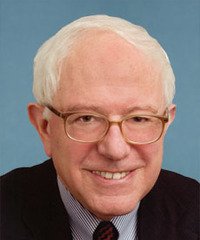
Bernie Sanders is serving his third term in the U.S. Senate after winning re-election in 2018. His previous 16 years in the House of Representatives make him the longest serving independent member of Congress in American history.
Born in 1941 in Brooklyn, Sanders attended James Madison High School, Brooklyn College and the University of Chicago. After graduating in 1964, he moved to Vermont. In 1981, he was elected (by 10 votes) to the first of four terms as mayor of Burlington. Sanders lectured at the John F. Kennedy School of Government at Harvard and at Hamilton College in upstate New York before his 1990 election as Vermont’s at-large member in Congress.
Media Consolidation
More than 70 years ago, the Supreme Court declared that a free press is not only “essential to the condition of a free society,” but also that "the widest possible dissemination of information from diverse and antagonistic sources is essential to the welfare of the public." Unfortunately, the diversity of information sources has greatly dwindled in traditional media, as a few enormous multinational media conglomerates have consolidated ownership of more and more television networks, cable channels, publishing, radio and Internet services and sites.
"The consequences of excessive media consolidation go to the very heart of the democratic process," Senator Sanders has said, echoing the concerns of the Supreme Court. "In my view, it is very dangerous for our country when a single company is able to own a local newspaper, television station and radio station in many communities around America. Opposing points of view aren't heard and our democracy suffers."
In 1983, the American media was dominated by 50 companies. Today, media ownership is overwhelmingly concentrated in just six corporations: Comcast, Disney-ABC, Time Warner, News Corp., Viacom and CBS. These giant media conglomerates not only control the vast majority of news content, but also the also distribution of that content.
“We cannot live in a vibrant democracy unless people get divergent sources of information.”
One-third of America's independently owned television stations have vanished since 1975, as have more than two-thirds of independently owned newspapers. The situation for ownership of radio stations follows a similar pattern. This extreme level of media consolidation suppresses diversity of opinions and ignores the needs and interests of local communities.
Senator Sanders has been a leader in the fight to stop media consolidation and to strengthen the public interest obligations of broadcasters. In the Senate, he is working hard to make sure that we hold all media companies responsible for providing content that serves the public and offers a diverse range of opinions. For instance, he strongly opposed attempts to gut the FCC ban on corporations from owning a local newspaper, TV station and radio station in the same market. That misguided effort would have further consolidated local media markets and take away independent voices in areas already woefully short on local news and substantive journalism.
Cable Television
Senator Sanders is a strong advocate for promoting competition in cable television, and has long fought against cable monopolies that raise rates on consumers year after year, limit local programming, and often reduce the channels available under basic cable packages. In Vermont and elsewhere, cable television is often an essential information service for consumers, and thus an affordable basic package is necessary for residents to remain informed and connected to their communities. In 2014, the Federal Communications Commission reported that cable prices rose 2.5 times faster than inflation from 1995-2013.
Net Neutrality
Senator Sanders has strongly opposed allowing internet service providers to restrict content and stifle innovation, and was pleased when the FCC voted last year to preserve strong net neutrality rules. That vote banned so-called “fast lanes” that would have allowed Internet service providers to charge for priority treatment, in essence dividing the internet into fast and slow lanes sold to the highest bidder. That misguided proposal would have changed the fundamental architecture of the Internet – replacing the even playing field we have now with a system where huge corporations would have increased control over access to online content. In spite of intense lobbying from the huge media corporations, FCC correctly – in Senator Sanders’ opinion – reclassified internet service providers as “common carriers,” which means they are subject to the same rules as other utilities.
The FCC vote on net neutrality shows that ordinary Americans can make a difference when they stand up to powerful corporate interests and Washington lobbyists. If we stand together, we can make sure the Internet stays open and free of discrimination.
Internet Access
Access to high-speed Internet is no longer a luxury – it is crucially important to participate fully in twenty-first century education, business development, health care, and so much more. Yet, the Organization for Economic Co?operation and Development ranks the U.S. just 16th in the world for high?speed internet access. Moreover, a significant "digital divide" still exists between Americans who have access to affordable high-speed communications networks and those who are not. "Throughout America, there are thousands of communities that still lack cell phone service and the adequate broadband services necessary for today's business and education," Senator Sanders has said.
The 2010 economic stimulus bill provided Vermont with a historic opportunity to significantly expand affordable broadband access. Vermont was awarded more than $172 million in federal funds – more than any other state on a per capita basis – for four separate broadband projects. While three of those projects are complete, Senator Sanders is very concerned that a federally-funded statewide wireless project is not yet operational.
Senator Sanders remains committed to ensuring that every Vermonter and every American has access to affordable broadband services in their homes and businesses. That is why his Rebuild America Act – a $1 trillion five-year plan to modernize America’s infrastructure – includes $5 billion a year to expand high?speed broadband networks into underserved and unserved areas.